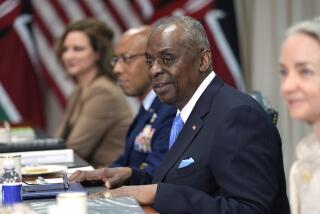Ex-Defense Secretary Aspin Dies After Suffering Stroke
- Share via
WASHINGTON — Former Defense Secretary Les Aspin, who was appointed to steer the Pentagon into the post-Cold War era but resigned under pressure after a series of missteps, died Sunday night after suffering a massive stroke Saturday. He was 56.
Michael Tebo, a spokesman for Georgetown University Medical Center, said Aspin died at 7:55 p.m. EDT Sunday at the hospital.
He noted that Aspin was “lucid, awake and speaking” when he was admitted to the hospital at 9:30 a.m. Saturday.
“Despite intensive medical intervention over the next 34 hours, his medical condition continued to deteriorate,” Tebo added.
Aspin’s cardiologist, David Perle, said Aspin’s ex-wife, brother and longtime girlfriend were with him when he died.
Tebo said funeral arrangements would be announced later.
A Wisconsin congressman for 22 years, Aspin was chairman of the House Armed Services Committee when President Clinton nominated him to be defense secretary. It was his second tour of duty at the Pentagon.
Aspin’s initial Pentagon experience came during the height of the Vietnam War when Defense Secretary Robert S. McNamara assembled a group of whiz kids to analyze weapon systems. More than two decades later, Aspin returned to oversee the downsizing of the military.
But his time at the helm was brief. Heart problems, political pressure and a series of public relations glitches forced his resignation in December, 1993.
A consummate Capitol Hill insider and a powerful voice on military issues, Aspin brought vast political experience to the challenges of the top defense job.
As he took office, Aspin became caught in the cross-fire over Clinton’s plan to drop the ban on gays in the military. At the same time, U.S. troops were trying to impose order in Somalia to allow the United Nations to feed the starving. And the military faced new challenges posed by the disintegration of the former Soviet Union and its Communist alliance in Eastern Europe, putting Aspin under pressure to make deep cuts in the military budget.
After 18 American soldiers were killed in an October, 1993, firefight with Somali clansmen, reports surfaced that Aspin had twice rebuffed military leaders when they recommended sending tanks and armored vehicles.
Aspin also drew criticism for his spending. He spent $3,105 to fix the roof of his Washington house to protect military security and communications equipment installed in his attic. He was also attacked for extending a business trip to Europe in order to vacation in Venice with his girlfriend. Expenses for his entourage cost taxpayers $42,000.
In February, 1993, he was hospitalized after suffering shortness of breath linked to a heart condition called hypertrophic cardiomyopathy, a thickening of the heart muscle. Doctors installed a pacemaker.
Aspin won praise from some quarters for his work to revise the ban on homosexuals and for expanding the role of women in the military. Aspin ordered the services to allow women to fly combat missions and serve on most Navy warships.
More to Read
Sign up for Essential California
The most important California stories and recommendations in your inbox every morning.
You may occasionally receive promotional content from the Los Angeles Times.













